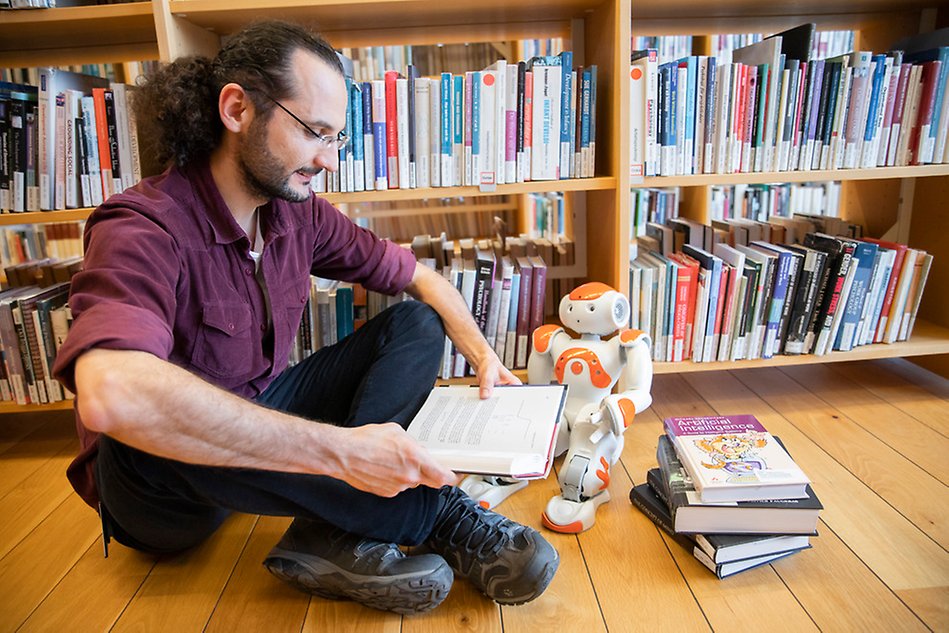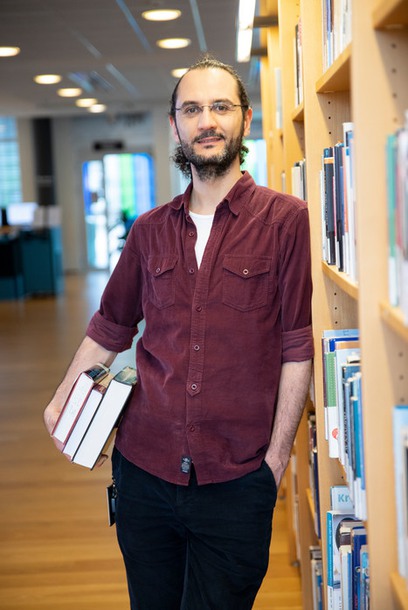Robots that understand, learn and imitate humans
How can robots become more intelligent? That is the ultimate question that Eren Erdal Aksoy wants to find the answer to.
“I am not interested in designing the latest version of a humanoid robot with two legs or two arms. Instead, I want to make them more intelligent by asking deep questions – how can they observe us, pursue us, learn from our behavior and transform that knowledge into their own internal system?”, says Eren Erdal Aksoy.

Eren Erdal Aksoy is an Assistant Professor at the School of Information Technology and active at the Center for Applied Intelligent Systems Research (CAISR).
”If my research is successful, it will definitely affect society. I would really like to see my different scientific theories applied in the real world. That would make me quite happy.”
Eren Erdal Aksoy
Eren Erdal Aksoy, Assistant Professor at Halmstad University, received his Bachelor degree in Electrical and Electronics Engineering in Turkey. Eren Erdal Aksoy was inspired from one of his senior supervisors and his way of approaching problems, thus, decided to stay in the academic world and focus on building and programming robots.
“I really enjoy the time when I program the robots myself since I can directly see them up and running. I get the feeling that everything in front of me is my achievement and I have full authority to change whatever needs an upgrade. I also enjoy teaching the younger generation how to build and program a small robot from scratch with electronic components”, says Eren Erdal Aksoy.
Several areas of application
There are several different areas of application for an intelligent system. You can implant it in a robot, a vehicle, a smartphone or in a pair of glasses.
“A robot can be designed with two arms and two legs that will come to your house, observe you and then imitate you as you clean and do general domestic work”.
As the number of people over 65 years will threefold over the next decades, while the number of young and working age people will diminish, intelligent service robots can be a useful help for the elderly.
“Your smartphone could use the same technique. In the grocery store for example, you can use the camera to identify a tomato, display the weight, colour, size and price. Your phone could also detect if a person approaching you is a criminal. The glasses can be helpful in household chores such as cooking, by guiding you through a recipe”, says Eren Erdal Aksoy.
Robots imitate human actions
In his PhD thesis from 2012, Eren Erdal Aksoy showed how we can understand human actions.

“For example, if a human demonstrates how to make a sandwich, using tomatoes and cucumbers, and the next day uses cheese and salami – how do we build a robot that has the capacity to observe and learn how to use a variation of objects and actions?”
Eren Erdal Aksoy has already developed a framework that can capture these variations, enabling robots to understand, learn, and to some degree imitate what you are doing. He is also part of an artificial intelligence team at Volvo that currently works to implement intelligent perception modules for autonomous trucks. The aim is to make a truck understand the environment enough to go from point A to point B autonomously without colliding with vehicles or pedestrians.
“Autonomous intelligent systems will save human lives. Studies show that most accidents are due to human error”, says Eren Erdal Aksoy.
Applied scientific theories
The dream is to implement a robot that can understand observed human actions, recall the most similar previously experienced episodes and imitate them, even in different contexts. If you, for instance, ask the robot what it remembers about your food preferences, it might tell you ‘I remember you once having pasta, so let me prepare a pasta dish for you’.
“If my research is successful, it will definitely affect society. I would really like to see my different scientific theories applied in the real world. That would make me quite happy”.
Text: Ragnhild Larsson
Photo: Ida Fridvall
Eren Erdal Aksoy – research and teaching
Eren Erdal Aksoy is an Assistant Professor at the School of Information Technology at Halmstad University. He is active at the Center for Applied Intelligent Systems Research (CAISR) and project manager for the research project SHARPEN (Scalable Highly Automated Vehicles with Robust Perception). The project is financed by Vinnova and done in collaboration with Volvo, among others. SHARPEN aims at developing so-called real time deep neural networks for self-driving vehicles. Eren Erdal Aksoy teaches the course "Deep Learning with Applications" which is given to students at the Master's Programme in Information Technology and to participants in the progam Education in AI for professionals.

